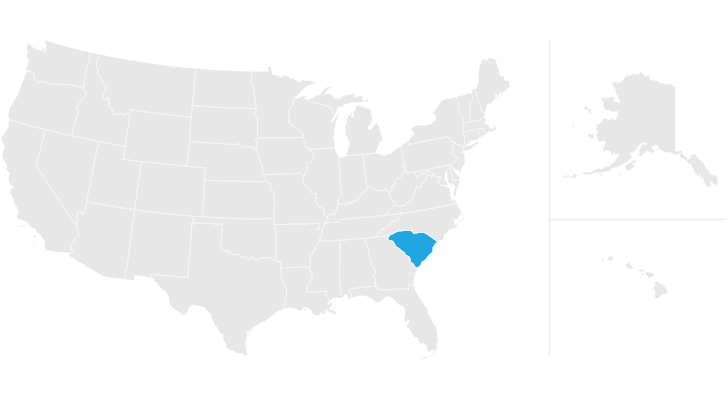While South Carolina has no estate tax, there is still the possibility that you will be subject to the federal estate tax. A financial advisor can help you sort through any estate planning questions you may have, or help you with general financial planning. SmartAsset’s free financial advisor matching tool can help you find financial advisors who serve your area.
South Carolina Estate Tax
There is no estate tax in South Carolina.
What Is an Estate Tax?
The estate tax is sometimes called the “death tax.” It is applied to a person’s estate after they die but before the money is distributed to their heirs.
The inheritance tax is different from the estate tax. Inheritance taxes are taken from a person’s inheritance after they have received it from the person who died.
South Carolina Inheritance Tax and Gift Tax

There is no inheritance tax in South Carolina. Make sure to check local laws if you’re inheriting something from someone who lives out of state. For instance, in Kentucky, all in-state property is subject to the inheritance tax, even if the person inheriting it lives out of state.
South Carolina also has no gift tax. The federal gift tax kicks in for gifts of more than $19,000 in 2026 and 2025. A gift over that amount to one person in a year will count against your 2026 lifetime exemption of $15 million.
Federal Estate Tax
Even though there is no South Carolina estate tax, the federal estate tax might still apply to you. The federal estate tax exemption is $15 million in 2026, up from $13.99 million in 2025. This tax is portable for married couples, meaning that if the right legal steps are taken, as of 2026 a married couple’s estate of up to $30 million is exempt from the federal estate tax when both spouses die.
If an estate exceeds that amount, the federal estate tax ranges from 18% to 40%. A full chart of federal estate tax rates can be found below.
Here’s an example of how it works: Let’s say the estate is worth $22.94 million and you aren’t married. After subtracting the $15 million exemption, you’re left with a taxable estate of $7.94 million. When you consult the chart, you will see that this estate is in the highest bracket. This means the base tax payment on the first $1 million of the estate is $345,800. The highest tax rate of 40% applies to the remaining $6.94 million. That equals $2.776 million in taxes. That figure plus the base taxes of $345,800 means the total estate tax burden is $3,111,800.
Federal Estate Tax Rates
| Taxable Estate* | Base Taxes Paid | Marginal Rate | Rate Threshold** |
| $1 – $10,000 | $0 | 18% | $1 |
| $10,000 – $20,000 | $1,800 | 20% | $10,000 |
| $20,000 – $40,000 | $3,800 | 22% | $20,000 |
| $40,000 – $60,000 | $8,200 | 24% | $40,000 |
| $60,000 – $80,000 | $13,000 | 26% | $60,000 |
| $80,000 – $100,000 | $18,200 | 28% | $80,000 |
| $100,000 – $150,000 | $23,800 | 30% | $100,000 |
| $150,000 – $250,000 | $38,800 | 32% | $150,000 |
| $250,000 – $500,000 | $70,800 | 34% | $250,000 |
| $500,000 – $750,000 | $155,800 | 37% | $500,000 |
| $750,000 – $1 million | $248,300 | 39% | $750,000 |
| Over $1 million | $345,800 | 40% | $1 million |
*The taxable estate is the total above the 2026 federal exemption of $15 million.
**The rate threshold is the point which the marginal estate tax rate kicks in.
Overall South Carolina Tax Picture

The income tax rate in South Carolina ranges from 0% to 6.2%. If you’re new to the Palmetto State or have a new job, you can see what your take home pay will be using our South Carolina paycheck calculator. Social Security is not taxed by the state, but retirement plan income and pensions are partially taxed. The average effective property tax rate in South Carolina is 0.45%, among the lowest in the country.
Estate Planning Tips
- If you’re planning an estate or thinking about your financial future in general, you might want to think about finding a financial advisor who can help you. Finding a financial advisor doesn’t have to be hard. SmartAsset’s free tool matches you with vetted financial advisors who serve your area, and you can have a free introductory call with your advisor matches to decide which one you feel is right for you. If you’re ready to find an advisor who can help you achieve your financial goals, get started now.
- Consider your beneficiaries. Many assets including retirement accounts, brokerage accounts and life insurance are passed on according to beneficiaries who you name. When you’re planning your estate, that’s a good time to ensure that you’ve selected beneficiaries and they are all up to date.
Photo credits: ©iStock.com/stocknshares, SmartAsset, ©iStock.com/AndreyKrav
